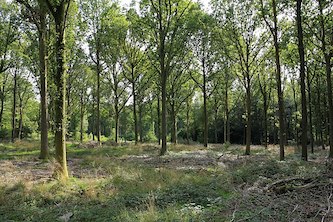A team of British experts has issued a warning that the forests in the UK could be in big trouble in the next 50 years. They’re concerned that factors like wind, fire, pests, and disease could cause the trees to suddenly die off, leaving the forests empty and lifeless. However, the experts believe that if we act quickly, we can prevent this disaster from happening.
The UK has fewer forests compared to other European countries, and it’s facing a bunch of challenges like climate change, loss of different types of plants and animals, invasive species, and damage from deer and grey squirrels. There’s also a lack of skills in the forestry sector, which makes it hard to meet the government’s goals for planting trees. To deal with these problems, the experts suggest planting forests with a mix of different tree types that can handle environmental pressures and are good for wildlife.
A study by Forestry England and the University of Cambridge also found other issues like competition with people for water, new pests and diseases, and extreme weather affecting how forests are managed. This study was published in the journal, Forestry, and it’s the first time that experts have looked ahead to see what could happen to UK forests.
Dr. Eleanor Tew from Forestry England and Cambridge University stressed the importance of taking action to make forests stronger for the next generations. She said that even though the situation is worrying, there’s still time to make a good difference and protect the happiness and benefits that forests bring to people.
In short, the experts are urging us to take action right away to deal with the problems facing the UK’s forests. By doing things like planting different types of trees and dealing with new issues, we can stop the forests from potentially collapsing and make sure they keep thriving for the next generations.
Original news source: UK forests face ‘catastrophic ecosystem collapse’ (BBC)
Listen
Slow
Normal
Fast
Group or Classroom Activities
Warm-up Activities:
– News Summary
Instructions: Divide the students into small groups. Give each group a few minutes to read the article and prepare a short news summary that they will present to the class. Encourage them to focus on the main points and to use their own words. After the presentations, discuss any new vocabulary or difficult phrases.
– Vocabulary Pictionary
Instructions: Write down key terms from the article (e.g., pests, invasive species, forestry, biodiversity) on individual slips of paper. Students take turns drawing a slip and illustrating the term on the board without speaking or writing words. Their teammates must guess the word based on the drawing. This activity helps reinforce vocabulary from the article.
– Future Predictions
Instructions: Have the students work in pairs to discuss and write down their predictions about the future of forests in the UK and around the world based on the information from the article. Afterward, ask each pair to share their predictions with the class and provide reasons for their thoughts. This can lead to a discussion on environmental issues and the importance of conservation.
– Opinion Spectrum
Instructions: Create a line in the classroom representing a spectrum of opinions from “strongly agree” to “strongly disagree.” Read out statements related to the article’s content, such as “The government is doing enough to protect forests” or “Climate change is the biggest threat to forests.” Students position themselves along the spectrum according to their opinion and then discuss their reasons with students nearby. This activity encourages speaking and critical thinking.
– Think-Pair-Share
Instructions: Pose a question to the class related to the article, such as “What steps can individuals take to help protect forests?” or “How do forests benefit society as a whole?” Students first think individually, then pair up to discuss their thoughts, and finally share their ideas with the larger group. This activity allows students to process information and articulate their thoughts in English.
Comprehension Questions:
1. What warning have the British experts issued regarding the forests in the UK?
2. What are some of the factors that could cause the trees in the UK forests to die off?
3. How does the amount of forest in the UK compare to other European countries?
4. What are the challenges mentioned that are affecting UK forests?
5. What solutions do the experts suggest to combat the problems facing the forests?
6. What additional issues were found in the study by Forestry England and the University of Cambridge?
7. Who is Dr. Eleanor Tew, and what does she say about the current situation of UK forests?
8. What actions are the experts urging us to take to protect the UK’s forests for future generations?
Go to answers ⇩
Listen and Fill in the Gaps:
A team of British experts has issued a (1)______ that the (2)______ in the UK could be in big trouble in the next 50 years. They’re concerned that (3)______ like wind, fire, pests, and disease could cause the trees to suddenly die off, leaving the forests empty and lifeless. However, the experts believe that if we act quickly, we can prevent this disaster from happening.
The UK has fewer forests compared to other European countries, and it’s facing a (4)______ of challenges like (5)______ change, loss of (6)______ (7)______ of plants and animals, invasive species, and damage from deer and grey squirrels. There’s also a lack of skills in the forestry sector, which makes it hard to meet the government’s goals for planting trees. To deal with these problems, the experts suggest planting forests with a mix of different tree types that can handle environmental pressures and are good for (8)______.
A study by Forestry England and the University of Cambridge also (9)______ other issues like competition with (10)______ for water, new pests and diseases, and (11)______ weather affecting how forests are managed. This study was published in the journal, Forestry, and it’s the first time that experts have looked ahead to see what could happen to UK forests.
Dr. Eleanor Tew from Forestry England and Cambridge University stressed the importance of (12)______ action to make forests stronger for the next generations. She said that even though the situation is worrying, there’s still time to make a good difference and protect the happiness and benefits that forests bring to people.
In (13)______, the experts are urging us to take action right away to deal with the (14)______ facing the UK’s forests. By (15)______ things like planting different types of trees and dealing with new (16)______, we can stop the forests from potentially collapsing and make sure they keep thriving for the next generations.
Go to answers ⇩
Discussion Questions:
Students can ask a partner these questions, or discuss them as a group.
1. What is your favorite type of forest to visit, and why do you like it?
2. How would you feel if the forests near where you live started to disappear?
3. Do you think it’s important for countries to have lots of forests? Why or why not?
4. Have you ever seen the effects of pests or diseases on trees? What was that like?
5. What do you think could happen if we don’t take care of our forests?
6. Do you believe climate change is a big threat to forests? Why or why not?
7. How do you think wildlife would be affected if forests started dying?
8. What is an invasive species, and can you think of any examples?
9. Have you ever heard of any projects to plant new trees in your area? What did you think about it?
10. Why do you think having a variety of different trees in a forest might be good?
11. Do you think it’s a good idea to share water with forests even if people need it too? Why or why not?
12. Can you think of any jobs that involve taking care of forests? Would you ever consider working in that field?
13. How do you think extreme weather could change the way forests look or function?
14. What actions do you think we could take right now to help protect forests for future generations?
15. Do you like the idea of making forests stronger? How do you think we could do that?
Individual Activities
Vocabulary Meanings:
Match each word to its meaning.
Words:
1. trouble
2. pests
3. invasive
4. competition
5. extreme
6. urging
7. collapsing
8. thriving
Meanings:
(a) Problems or difficulties
(b) Growing and doing well
(c) Strongly advising or pushing for action
(d) Falling down suddenly
(e) Non-native species that cause harm to the environment
(f) Struggle against others for something
(g) Very severe or serious
(h) Annoying insects or animals that harm plants
Go to answers ⇩
Multiple Choice Questions:
1. What are the main factors that could cause the UK forests to suddenly die off?
(a) Pollution, deforestation, drought, and flooding
(b) Urbanization, overpopulation, earthquakes, and tsunamis
(c) Soil erosion, climate change, invasive species, and overharvesting
(d) Wind, fire, pests, and disease
2. What is one of the challenges the UK forests are facing?
(a) Lack of sunlight and water
(b) Lack of interest from the government
(c) Lack of wildlife in the forests
(d) Lack of skills in the forestry sector
3. What do the experts suggest planting in the forests to handle environmental pressures and benefit wildlife?
(a) A mix of different tree types
(b) Only one type of tree
(c) Shrubs and bushes
(d) Flowers and grass
4. What did the study by Forestry England and the University of Cambridge find?
(a) Lack of funding, lack of interest, and lack of resources
(b) Competition with people for water, new pests and diseases, and extreme weather affecting forest management
(c) Overpopulation of deer and grey squirrels, loss of plants and animals, and lack of government support
(d) Pollution, deforestation, and climate change affecting forest health
5. Who stressed the importance of taking action to make forests stronger for the next generations?
(a) The Prime Minister of the UK
(b) A famous environmental activist
(c) Dr. Eleanor Tew from Forestry England and Cambridge University
(d) The CEO of a big forestry company
6. What are the experts urging people to do to deal with the problems facing the UK’s forests?
(a) Wait and see what happens
(b) Ignore the warnings and continue as usual
(c) Take action right away, like planting different types of trees and dealing with new issues
(d) Cut down all the trees to prevent the potential collapse
7. What is the main message of the article?
(a) The UK’s forests are facing challenges, but there is still time to make a positive difference and protect them for future generations
(b) The UK’s forests are doomed and there’s nothing we can do about it
(c) The UK’s forests are not important and should be replaced with something else
(d) The UK’s forests are not in trouble and everything is fine
8. What is the best way to prevent the potential collapse of the UK’s forests?
(a) Ignoring the warnings and hoping for the best
(b) Taking action right away, like planting different types of trees and dealing with new issues
(c) Cutting down all the trees to start over
(d) Moving all the forests to a different country
Go to answers ⇩
True or False Questions:
1. The UK has fewer forests compared to other European countries and is facing challenges like climate change, loss of plant and animal species, invasive species, and damage from deer and grey squirrels.
2. To address these problems, experts suggest planting forests with a mix of different tree types that can handle environmental pressures and are good for wildlife.
3. British experts are warning that the UK’s forests could be in serious trouble in the next 50 years due to factors like wind, fire, pests, and disease.
4. There is a lack of skills in the forestry sector, making it difficult to meet the government’s goals for planting trees.
5. Dr. Eleanor Tew did not stress the importance of taking action to make forests stronger for the next generations, despite the worrying situation.
6. A study by Forestry England and the University of Cambridge did not find issues like competition with people for water, new pests and diseases, and extreme weather affecting how forests are managed.
7. This study is not the first time experts have looked ahead to see what could happen to UK forests.
8. Experts are not urging immediate action to deal with the problems facing the UK’s forests, such as planting different types of trees and addressing new issues to ensure the forests keep thriving for future generations.
Go to answers ⇩
Write a Summary:
Write a summary of this news article in two sentences.
Check your writing now with the best free AI for English writing!
Writing Questions:
Answer the following questions. Write as much as you can for each answer.
Check your answers with our free English writing assistant!
1. What are the main threats to UK forests that have the experts concerned?
2. How does the amount of forest in the UK compare to other European countries?
3. What are some of the challenges mentioned that are affecting the UK’s forests?
4. What solutions do the experts propose to address the problems facing the forests?
5. Why does Dr. Eleanor Tew believe it’s important to take action now regarding the health of the forests?
Answers
Comprehension Question Answers:
1. What warning have the British experts issued regarding the forests in the UK?
The experts have warned that the UK forests could face a major die-off of trees within the next 50 years due to various threats.
2. What are some of the factors that could cause the trees in the UK forests to die off?
Factors such as wind, fire, pests, and disease could lead to the sudden death of trees in the forests.
3. How does the amount of forest in the UK compare to other European countries?
The UK has less forest area compared to other European countries.
4. What are the challenges mentioned that are affecting UK forests?
Challenges include climate change, loss of biodiversity, invasive species, damage from deer and grey squirrels, and a lack of forestry skills.
5. What solutions do the experts suggest to combat the problems facing the forests?
Experts suggest planting a variety of tree species that can withstand environmental pressures and support wildlife, as well as addressing new threats as they arise.
6. What additional issues were found in the study by Forestry England and the University of Cambridge?
The study found issues like competition for water, new pests and diseases, and the impact of extreme weather on forest management.
7. Who is Dr. Eleanor Tew, and what does she say about the current situation of UK forests?
Dr. Eleanor Tew is from Forestry England and Cambridge University, and she says that while the situation is concerning, there is still time to take positive action to strengthen forests for future generations.
8. What actions are the experts urging us to take to protect the UK’s forests for future generations?
Experts are urging immediate action to address the problems, such as planting diverse types of trees and tackling new challenges to prevent potential forest collapse and ensure their continued health.
Go back to questions ⇧
Listen and Fill in the Gaps Answers:
(1) warning
(2) forests
(3) factors
(4) bunch
(5) climate
(6) different
(7) types
(8) wildlife
(9) found
(10) people
(11) extreme
(12) taking
(13) short
(14) problems
(15) doing
(16) issues
Go back to questions ⇧
Vocabulary Meanings Answers:
1. trouble
Answer: (a) Problems or difficulties
2. pests
Answer: (h) Annoying insects or animals that harm plants
3. invasive
Answer: (e) Non-native species that cause harm to the environment
4. competition
Answer: (f) Struggle against others for something
5. extreme
Answer: (g) Very severe or serious
6. urging
Answer: (c) Strongly advising or pushing for action
7. collapsing
Answer: (d) Falling down suddenly
8. thriving
Answer: (b) Growing and doing well
Go back to questions ⇧
Multiple Choice Answers:
1. What are the main factors that could cause the UK forests to suddenly die off?
Answer: (d) Wind, fire, pests, and disease
2. What is one of the challenges the UK forests are facing?
Answer: (d) Lack of skills in the forestry sector
3. What do the experts suggest planting in the forests to handle environmental pressures and benefit wildlife?
Answer: (a) A mix of different tree types
4. What did the study by Forestry England and the University of Cambridge find?
Answer: (b) Competition with people for water, new pests and diseases, and extreme weather affecting forest management
5. Who stressed the importance of taking action to make forests stronger for the next generations?
Answer: (c) Dr. Eleanor Tew from Forestry England and Cambridge University
6. What are the experts urging people to do to deal with the problems facing the UK’s forests?
Answer: (c) Take action right away, like planting different types of trees and dealing with new issues
7. What is the main message of the article?
Answer: (a) The UK’s forests are facing challenges, but there is still time to make a positive difference and protect them for future generations
8. What is the best way to prevent the potential collapse of the UK’s forests?
Answer: (b) Taking action right away, like planting different types of trees and dealing with new issues
Go back to questions ⇧
True or False Answers:
1. The UK has fewer forests compared to other European countries and is facing challenges like climate change, loss of plant and animal species, invasive species, and damage from deer and grey squirrels. (Answer: True)
2. To address these problems, experts suggest planting forests with a mix of different tree types that can handle environmental pressures and are good for wildlife. (Answer: True)
3. British experts are warning that the UK’s forests could be in serious trouble in the next 50 years due to factors like wind, fire, pests, and disease. (Answer: True)
4. There is a lack of skills in the forestry sector, making it difficult to meet the government’s goals for planting trees. (Answer: True)
5. Dr. Eleanor Tew did not stress the importance of taking action to make forests stronger for the next generations, despite the worrying situation. (Answer: False)
6. A study by Forestry England and the University of Cambridge did not find issues like competition with people for water, new pests and diseases, and extreme weather affecting how forests are managed. (Answer: False)
7. This study is not the first time experts have looked ahead to see what could happen to UK forests. (Answer: False)
8. Experts are not urging immediate action to deal with the problems facing the UK’s forests, such as planting different types of trees and addressing new issues to ensure the forests keep thriving for future generations. (Answer: False)
Go back to questions ⇧













